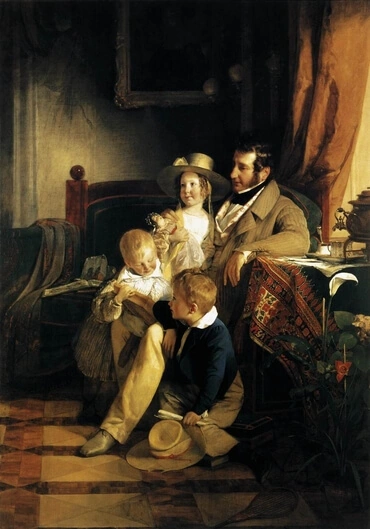34
你行淫與別的婦女相反,因為不是人從你行淫;你既贈送人,人並不贈送你;所以你與別的婦女相反。

Father in the Word means what is most interior, and in those things that are following the Lord's order, it means what is good. In the highest sense Father means the Lord Himself, the creator. In the generation of natural children it is the father who provides the soul or the most interior receptacle of life, and an internal heredity, and the mother who provides all of the substance that the soul uses to form its body, plus an external heredity. In this process the soul comes from the Lord through the father, and not from the father, since all life is from the Lord. The wise person calls the Lord his father and the church his mother because his interior loves come from the Lord, but are given form and actuality through the truths taught by the church. Those things thus brought forth are a person's spiritual "children". In the New Testament, when speaking of Jesus and the Father, what is meant is the outward manifestation with the divine itself as the soul inside. Because Jesus was born from a natural mother, He had a natural body and a natural Jewish heredity. Throughout his life as He was tempted by the hells, He slowly put off all he had from His mother and replaced it with what He had from Himself inside, the Father. In doing this he made himself one with the Father that was His inmost so He could truly say, "I and my Father are one".
3412. “在他父亲亚伯拉罕的日子, 他父亲的仆人所挖的井, 非利士人全都塞住” 表拥有认知的记忆知识之人不愿知道出自神性的内层真理, 因而抹掉了它们. 这从 “井” 和 “塞住” 的含义, 以及 “非利士人” 的代表清楚可知: “井” 是指真理 (2702, 3096节), 在此是指出自神性的内层真理, 因为经上说这表示真理的井是 “在他父亲亚伯拉罕的日子, 他父亲的仆人所挖的”, 而亚伯拉罕代表主的神性本身 (2011, 2833, 2836, 3251, 3305节); “塞住” 是指不愿知道, 因而是指抹掉; “非利士人” 是指那些只拥有认知的记忆知识之人 (1197, 1198节).
现在论述的主题是属于较低层级的真理表象, 它们存在于那些拥有认知的记忆知识之人, 也就是此处 “非利士人” 所表示的人身上. 至于出自神性, 被那些所谓的 “非利士人” 抹掉的内层真理, 情况是这样: 在古教会和古教会之后, 那些很少考虑生活, 却大量思想教义, 并且随着时间推移, 甚至拒绝接受生活事务, 而是承认信的事务 (这信脱离生活) 为教会的本质要素之人就被称为 “非利士人”. 结果, 他们根本不重视仁之教义, 从而抹掉了它们, 而在古教会, 仁之教义是教义的全部和主旨. 相反, 他们过分夸耀信之教义, 将其整个宗教都集中于这些教义. 他们就这样背离仁爱的生活, 也就是背离作为生活之全部和主旨的仁爱, 故比起其他所有人, 他们更是被称为 “未受割礼的”. 因为 “未受割礼的” 是指所有没有仁爱的人, 无论他们多么精通教义 (2049节).
那些背离仁爱的人也远离智慧和聪明, 因为若没有良善, 即仁爱, 没有人能在真理方面变得智慧, 聪明. 事实上, 一切真理皆源于良善, 并关注良善, 以致人若没有良善, 就不可能理解真理, 甚至不愿知道它. 在来世, 这种人远离天堂; 有时他们身上的光看似亮白如雪, 但这光就像冬天里的光, 缺乏温暖, 产不出果实. 这也解释了为何这种人一接近天堂, 他们的光就转化为纯粹的黑暗, 其心智变成类似那黑暗的东西, 也就是愚蠢. 由此可见, “只拥有认知的记忆知识之人不愿知道出自神性的内层真理, 因而抹掉了它们” 这句话是什么意思.